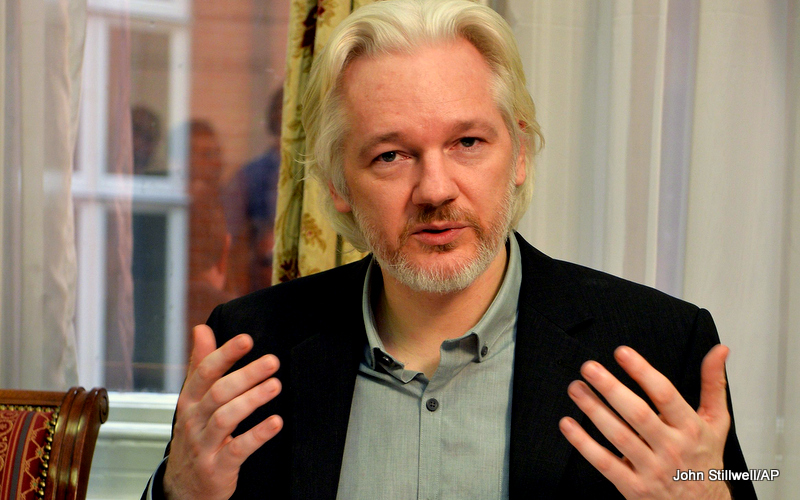
Since June 2012, WikiLeaks co-founder and editor-in-chief Julian Assange has been a virtual prisoner in the Ecuador’s embassy in London. With the embassy being surveilled by the Metropolitan Police Service around the clock to arrest Assange immediately should he leave the premises, Assange has not set a foot outside of the embassy in more than two years.
This may have been a factor in Monday’s announcement that Assange plans to leave the embassy “soon.” Without offering any significant details, WikiLeaks’ spokesman Kristinn Hrafnsson indicated that Assange does not have any intentions to surrender himself to British authorities, who seek to extradite him to Sweden to face allegations of sexual assault.
“He is ready to leave at any moment as soon as the ridiculous siege outside will stop and he is offered safe passage,” said Hrafnsson.
Sweden has brought allegations of one count of unlawful coercion, one count of lesser degree rape and two counts of sexual molestation against Assange toward two women — a then-26-year-old from Enköping (as of the date of the complaints, Aug. 20, 2010) and a then-31-year-old from Stockholm. Despite the fact that the original prosecution closed the investigation due to lack of basis to substantiate the charges, the investigation was restarted.
Questions concerning the notion that Sweden has yet to formally charge Assange with an actual crime led to Ecuador granting Assange political asylum. On the basis of being suspected on reasonable grounds of committing the sexual offenses, the Stockholm District Court — at the bequest of the Swedish public prosecutor’s office — ordered Assange detained in absentia.
This is due to the likelihood that Assange may attempt to avoid justice, that the sentence he faces carries a prison term of at least two years, and that there are no reasons obvious to the court for Assange to receive immunity from detention. The detention would permit Swedish prosecutors to question Assange toward determining if there is a basis for charges to be pressed.
The Swedish prosecutors have declined the invitation to interview Assange in London. In the Swedish legal system, formal indictment comes only after it has been decided that the case should go to court, with the trial starting no later than two weeks after the indictment is issued.
While Ecuador is neither supporting Assange’s claims of innocence nor denying Sweden’s allegations, Ecuador does support Assange’s claim that extradition to Sweden would lead to an extradition to the United States. Assange faces a possible life sentence for abetting, facilitating and conspiring in the theft of classified material and the publication of said material under the Espionage Act of 1917.
Assange is suspected of playing a major material role in the distribution of 91,731 Afghan War Logs documents, 391,832 Iraq War Logs reports and 251,287 U.S. State Department cables. Representing the largest classified material theft in American history, the documents were downloaded by Chelsea Manning. The logs and the accompanying leaked videos significantly undermined the federal government’s story about how it conducted the Afghan and Second Iraq Wars.
The United Kingdom, as part of the UKUSA Agreement — also known as “Five Eyes,” also lost classified documents that were in the possession of the U.S. at the time of the leak. While it has not been explicitly pointed to as a possible objective, the U.K. may also want to talk to Assange regarding the publication of the war logs.
Manning is currently serving a 35-year prison sentence, with the possibility of parole after eight years. The U.S. has yet to file formal charges against Assange and opinions are split among the Obama administration about whether prosecuting Assange is worth the expense and difficulty involved.
“Two years ago, after a profound investigation and review of our legal obligations, we decided to give political asylum to Julian Assange,” wrote Ricardo Patiño, foreign minister for Ecuador, in an op-ed for The Guardian, published on Sunday. “This decision followed a dramatic change in our global understanding of privacy, telecommunications and diplomacy over the past few years.”
“The millions of documents published by Wikileaks about the political, economic and military manoeuvres of powerful interests also magnified delicate matters of sovereignty and abuse of power,” he continued.
“All states have secrets. And all states have the right to defend themselves. But this must not whitewash the grave violations of human rights, including war crimes and crimes against humanity, of which we have learned.”
It has been alleged that confinement in the embassy and long-term lack of sunlight are contributing to a potentially fatal heart condition, which may be prompting Assange’s threatened exodus. The embassy has repeatedly asked the British Foreign Office for permission to transport Assange to a hospital, with all requests being ignored. According to a confidential source to The Mail, Assange has critically high blood pressure, lung complications and cardiac arrhythmia.
“We are concerned about the consequences of an eventual medical emergency without access to hospital facilities or care,” Patiño wrote. “The United Kingdom and Sweden should consider whether they are willing to assume such consequences.”

